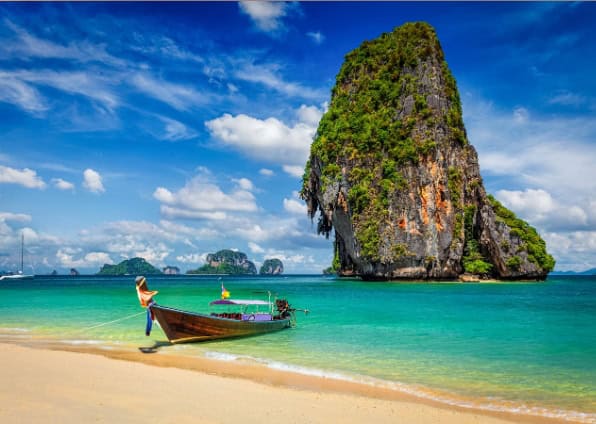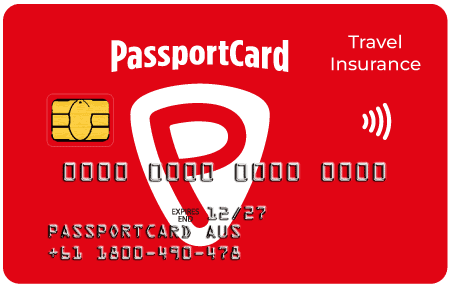

Thailand Travel Guide
Renowned for its stunning beaches, vibrant cities, delectable cuisine and rich cultural heritage, Thailand is one country that features heavily on plenty of Australians’ travel itineraries.
If you, like so many other Aussies, are eager to tick Thailand off your travel bucket list, make sure you do some research before you jet off to find out a little more about what you can expect and how to prepare for your trip, in this guide, we’ll share plenty of helpful Thailand travel tips to help you plan an escape that’s everything you want it to be, and hopefully even more!
What to know about visiting
Climate
The weather in Thailand can vary significantly depending on the time of year and the regions you are travelling to.
The cooler and less humid conditions between November and February are typically considered to be the best time of year to visit. You can generally expect very hot weather from March until May, which can still be great if you’re sticking to the beaches. The rainy season gradually takes hold from June, peaking around September and October when you can expect to encounter heavy daily deluges, particularly in the more mountainous regions up north.
Culture and language
Thai is the official language spoken throughout Thailand, however, many of the locals in tourist areas will speak English making it relatively easy to get by. Many restaurants provide English-translation menus and you shouldn’t have too much trouble communicating in hotels, however, it can still be helpful to learn a few basic phrases which you can use as a sign of respect toward the locals.
The vast majority (around 95 per cent) of Thai people are Buddhist, with religion playing a very significant role in almost every aspect of their lives.
When greeting someone, it’s customary to hold your palms together in front of the chest and gently dip your head as a sign of respect. Avoid shaking hands unless initiated by the other person. It’s also important to dress modestly (covering the shoulders and upper legs) and to remove your shoes when visiting religious sites, and you should never point the soles of your feet toward another person or Buddhist image.
The royal family is highly respected throughout Thailand and showing any type of disrespect toward them is considered a criminal offence. It’s also helpful to know that e-cigarettes and smoking on some beaches is illegal. Thailand also has very strict laws and penalties relating to drug offences, including the death penalty.
Haggling is also commonplace in markets in Thailand. While it can seem a little daunting if you’ve never haggled before, provided you act fairly and respectfully, you should get the hang of it pretty quickly.
Getting around
Most parts of Thailand are well-geared toward tourists and getting around is a relatively easy task. Most tourists opt to use either tuk-tuks, taxis, songthaew (covered pickup trucks with rows of seats in the back) or private ride-sharing apps like Grab.
It’s not uncommon for tourists to be overcharged when using tuk-tuks and unmetered taxis, so ask some of the locals approximately how much a journey should cost in advance to avoid paying inflated prices.
Scooters and Motorbikes are another common form of transport in Thailand. If you choose to hire a motorbike while in Thailand, just make sure it comes with adequate vehicle insurance in case you have an accident. You’ll be pleased to know our travel insurance provides cover for claims that arise from the use of a motorbike, provided you wear a helmet and meet the local license requirements for the motorbike you are riding. If the motorbike is more than 125cc, you’ll also need to have a current and valid licence required for driving an equivalent-rated Motorcycle in Australia.
Accommodation
Thailand offers a variety of accommodation options including everything from luxury hotels, resorts and private villas to budget backpacker hostels. Depending on where you travel, you may even be able to stay in a beach bungalow, a floating raft house or a rustic hill tribe hut!
You’ll generally find that most of the accommodation in Thailand is relatively affordable compared to what you might expect to pay in Australia when you consider the quality of the rooms and facilities and the level of service provided.
Entry requirements
If you are travelling to Thailand as a tourist on an Australian passport, you are not required to obtain a visa provided you do not stay for longer than 30 days. If you are entering Thailand through a land entry point, you will be restricted to no more than two visits per calendar year.
It’s always a good idea to visit the Australian government’s Smartraveller website before your trip for the latest information and updates about travelling to Thailand.
Best ways to experience Thailand
Australians have a major love affair with Thailand. Whether you’re seeking tranquil island escapes, bustling street markets, ancient temples or lush jungles, Thailand really does offer it all.
So where do you start?
To help you plan the ultimate Thailand escape, here are a few of our favourite activities and attractions that are well worth adding to your travel itinerary.
- Take a temple tour in Bangkok – Bangkok is brimming with vibrant and bustling street life and plenty of cultural experiences. Taking a temple tour is a great way to take in the many sights of the capital city while becoming acquainted with the country’s rich Buddhist history.
- Explore Bangkok’s floating markets – Bangkok is home to several floating markets, where you can get an authentic experience of Thai life while taking in the unique sights, sounds, smells and tastes of Thailand.
- Soak up Thailand’s beautiful beaches – Thailand is famed for its beautiful beaches and many tourists visit the nation purely to take in the white sand, pristine waters, lush palm trees and breath-taking natural scenery. Phuket and Koh Phi Phi are ideal destinations if you want beautiful beaches backed up by a thriving nightlife, but if you’d prefer something a little more laid-back, Krabi may be more to your taste.
- Stay overnight in an elephant sanctuary – Particularly if you’re travelling with kids, staying at an elephant sanctuary will be an unforgettable experience where you can take care of retired elephants, helping to feed and wash them. Just be mindful to research the individual elephant sanctuary before booking, as some are known for their unethical practices.
- Explore Chiang Mai’s Old City – If you want your Thai experience to include much more than just beaches, consider travelling to the more mountainous region of Thailand to the likes of Chiang Mai. Here you’ll be able to explore the historical Old City, taking in temples like Wat Lok Moli, Wat Chiang Man and Wat Chedi, along with other attractions like the Three Kings Monument and the Buak Haad Public Park. Make sure you also enrol in a cooking class while there as it’s an experience that’s sure to leave a lasting impression.
Please refer to the relevant PDS before purchasing our travel insurance to understand what is, and is not, covered by the policy to ensure it is the right cover for you.
Thailand travel insurance FAQs
If after visiting Thailand you will be travelling to another country that requires Covid 19 testing, it is essential that you get travel insurance with Covid 19 cover prior to your trip.
Even if you’ll only be travelling to Thailand, it’s always smart to get travel insurance so you know you’re prepared if something doesn’t go to plan. From medical emergencies to lost luggage, travel insurance can come in handy in a variety of situations. Choosing cover that also offers instant claims can also be invaluable while travelling abroad.
The best way to find out how much it will cost to get cover to travel to Thailand is to get an instant quote with PassportCard. It only takes a couple of minutes to get a personalised quote by providing some basic details such as your age, destination/s, travel dates and the level of cover you would like.
Not automatically. If you’re planning on doing any adventure activities like cascading, deep sea fishing, mountain biking, mud buggying, paragliding, quad bike riding, outdoor rock climbing, segway tours or sky diving, you’ll need to add Adventure Activities Cover when you purchase your travel insurance to make sure you’ll be covered.
No. Many Australians don’t realise that they won’t be covered by Medicare when overseas. Purchasing travel insurance with cover for medical emergencies and evacuation is essential to ensure you won’t be left to foot the bill if you become seriously sick or injured while travelling.
Simply call our Global Assistance team on +61 1800 490 478 or contact us on WhatsApp. Our Australian-based Global Assistance team is available 24/7 and can quickly handle most common claims on-the-spot over the phone.
Preparing for your trip to Thailand
All set for your Thailand escape?
Make sure you’ve ticked these items off your checklist before you head off:
- Check your passport is valid with at least 6 months of validity left from the date you plan to leave the country
- Ensure you meet the visitor entry requirements for Thailand
- Speak to your doctor to check if you’ll need any vaccinations. Most doctors will recommend you be vaccinated for hepatitis A, tetanus and typhoid, but they may also recommend a rabies vaccination or anti-malarial prophylaxis depending on the regions you will be visiting
- Arrange a travel currency card or another method of payment to cover expenses while you’re away
- Notify your financial institution of your plans to travel
- Contact your phone provider to ensure your phone plan will cover you while you’re away or purchase a pre-paid international sim card
- Arrange accommodation for each location you plan to stay in
- Consider booking any tours or activities you want to do in advance, particularly if you will be visiting during peak season when things can book out well in advance
- Remember to pack your mosquito repellent and use mosquito nets when available in your accommodation, as Thailand is home to many mosquito or insect-borne diseases such as malaria, zika virus, dengue, chikungunya, Japanese encephalitis and filariasis
- Provide details of your travel plans to a family member or close friend not travelling with you so you can be contacted in case of an emergency
- Save the details of how to access emergency consular assistance in case you need it
- Organise your travel insurance with PassportCard.
Get covered for your trip to Thailand with PassportCard



Instant payouts on approved claims with PassportCard
When you choose PassportCard, you’ll enjoy the extra peace of mind of knowing you’ll be able to cover most expenses there and then if something goes wrong.
When you purchase one of our travel insurance policies, we’ll ask you if you’d like a PassportCard to take with you on your trip. If something happens while you’re away (like your luggage is delayed, your cash is stolen or you experience a medical issue), our team can handle your claim quickly over the phone and transfer funds to your PassportCard on-the-spot**.
If approved, you’ll be able to withdraw cash to cover expenses that can arise from things like delayed luggage or stolen cash, or if it’s a medical issue, we can instantly add funds to your PassportCard so you can immediately pay for expenses when you need to.
You won’t need to fill out any paperwork and instant access to funds means you won’t be left out of pocket.
Find out more about how instant claims work or get a quote for your upcoming trip.












